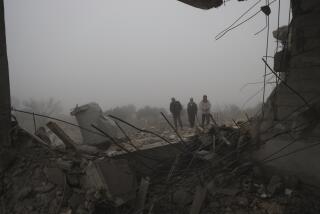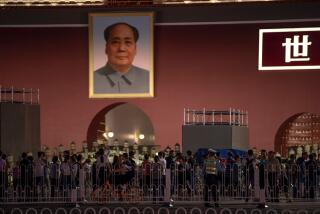Militants Take Another Hostage in Baghdad
- Share via
BAGHDAD — Militants in Iraq said Friday that they had kidnapped an Egyptian diplomat, according to a video aired on the satellite television channel Al Jazeera.
Meanwhile, another militant group, holding seven foreign civilians hostage, issued a new taped statement to the Qatar-based news organization, making additional demands for their release.
In the city of Fallouja, west of Baghdad, U.S. forces launched an airstrike Friday morning on a house, while to the south, radical Shiite leader Muqtada Sadr lashed out at the interim Iraqi government during a Friday sermon in the city of Kufa.
A brief clip without sound was aired on Al Jazeera showing a man seated in front of six figures wearing black clothes and hoods with white headbands. Some of the men, who were said to be members of a group called the “Lions of Allah and Islam Brigades,” were seen brandishing weapons. The hostage was identified as Mohammed Mamdouh Helmi Qutb, an official with the Egyptian Embassy in Baghdad.
Al Jazeera said Qutb was abducted in response to statements by the Egyptian prime minister indicating his nation’s willingness to dispatch experts to help train Iraqi security forces.
Al Jazeera also reported that the Egyptian Embassy in Baghdad had confirmed the abduction of one of its officials. The report could not be independently confirmed.
If true, it represents a new direction in a rash of kidnappings of foreigners working in Iraq. Previous hostages almost exclusively have been truck drivers or laborers. This would be the first reported abduction of a foreign diplomat.
Representatives of foreign government have been attacked, and the Jordanian Embassy was hit by a car bomb last year.
Egypt has no troops in Iraq, and the abduction appeared to be aimed at discouraging Cairo from cooperating with the new government. Iraq’s interim prime minister, Iyad Allawi, is on a tour of Arab capitals, soliciting assistance from regional governments.
The second militant group, calling itself the “Holders of the Black Banners,” released a taped statement Friday, issuing a new deadline and additional demands for the release of seven truck drivers -- three Kenyans, three Indians and an Egyptian.
Earlier in the week, the group demanded that the Kuwait & Gulf Link Transport Co., which employs the men, cease operations in Iraq. But Friday’s statement called on the company to compensate families of victims of U.S. attacks in Fallouja and demanded the release of Iraqi prisoners in American and Kuwaiti jails. The company was given 48 hours to comply.
The Fallouja strike, according to a U.S. military statement, “targeted 10-12 terrorists with known ties to the Abu Musab al Zarqawi network of foreign terrorists.”
U.S. forces have repeatedly launched air attacks in Fallouja, saying they are targeting houses used by Zarqawi associates. Friday’s strike hit a courtyard outside a residence in the western neighborhood of Jubail but left the structure intact, the military said.
The bombing prompted an angry response during the Friday sermon in one of Fallouja’s main mosques. Sheik Jamal Nazal called the United States’ claim of targeting Zarqawi operatives “false excuses to attack the city, just like the excuse of the weapons of the mass destruction that they used to invade Iraq.”
In the holy city of Kufa, Sadr made his first appearance at Friday prayers in two months. Calling Allawi a “representative of the occupation,” the cleric criticized the prime minister’s recent decision to permit the reopening of the Sadr-affiliated newspaper Al Hawza.
The now-disbanded Coalition Provisional Authority shut down the paper in April, prompting a two-month uprising by Sadr supporters in Baghdad and several southern cities.
In his Friday sermon, Sadr said Allawi didn’t have the authority to reopen the paper because he didn’t order its closure. Sadr also reportedly criticized the beheading of foreign hostages as “illegal according to Islamic law.”
*
A Times special correspondent in Fallouja contributed to this report, and wire services were used in compiling it.
More to Read
Sign up for Essential California
The most important California stories and recommendations in your inbox every morning.
You may occasionally receive promotional content from the Los Angeles Times.













